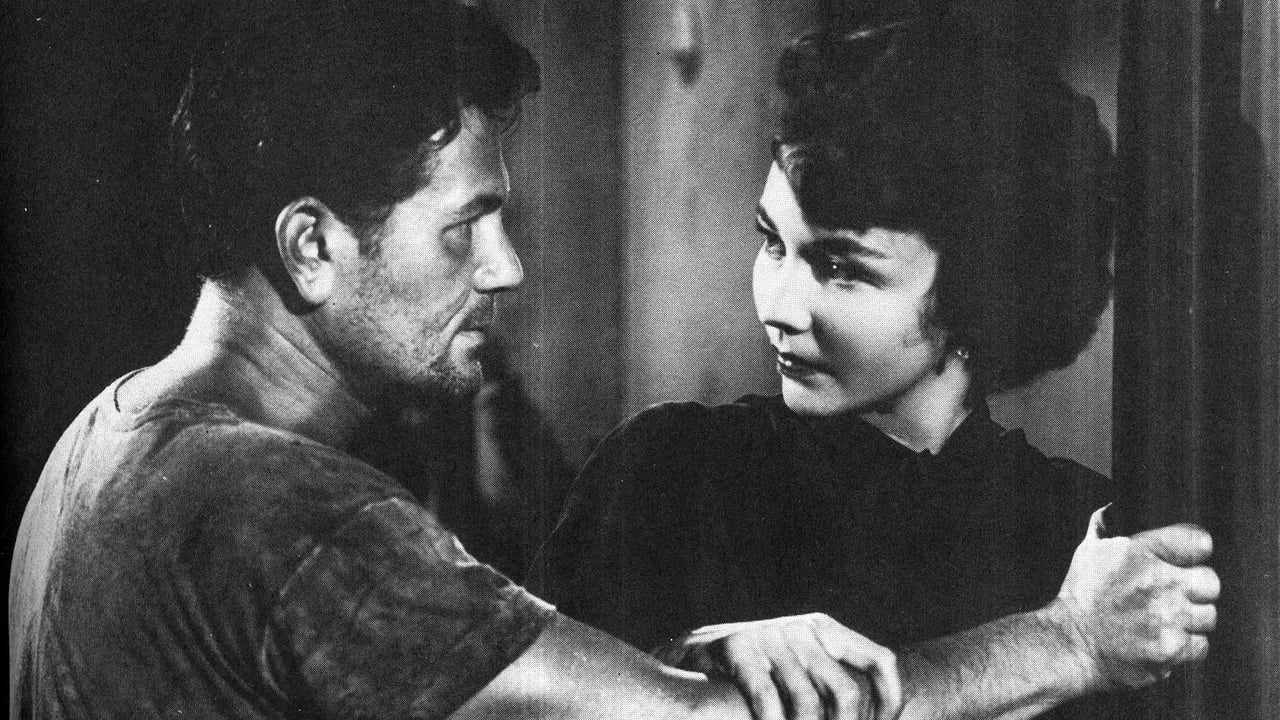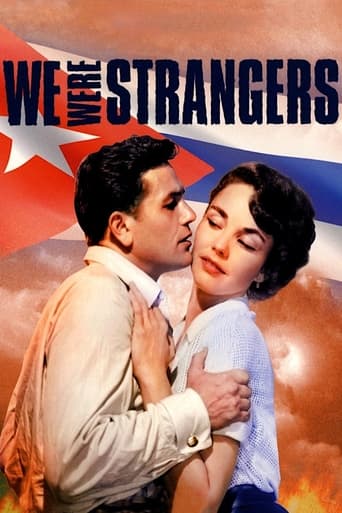



This is How Movies Should Be Made
Most undeservingly overhyped movie of all time??
Lack of good storyline.
a film so unique, intoxicating and bizarre that it not only demands another viewing, but is also forgivable as a satirical comedy where the jokes eventually take the back seat.
View MoreThere is just one major problem: Huston's attack on dictatorship in Cuba is around twenty years out of date. The dictator and his cronies had long been overthrown and the political situation settled before this film was made, so it cannot be taken as a current criticism, even though the backgrounds, the costumes and the mise- en-scene could be taken for contemporary 1949 Cuba.In other respects, thanks to John Huston's skillful direction and his arresting, if somewhat florid script (based on a short story by Robert Sylvester), and thanks to an almost faultless line-up of players led by the charismatic Jennifer Jones and an appropriately aggressive John Garfield, the movie certainly provides edge-of-the- seat suspense.I'm writing the above, having just tackled this gripping movie on its excellent Mill Creek DVD. Oddly, it didn't come across to me so well when I saw it in a 16mm screening at a film society way back in the 1990s. I thought the pacing too slow, although it did come to a slam-bang action climax - even though the villains were disposed of in a rather fortuitous and disappointingly off-handed fashion.
View MoreCuban-accented Jennifer Jones (as China Valdes) watches as her 19-year-old brother is shot protesting the island's tyrannical government. Vengeful, she joins the revolutionary underground. Accepted in the resistance, Ms. Jones finds romance with Havana-born John Garfield (as Tony Fenner), who returns from the US to becomes a partner. On her first assignment, Jones re-encounters Pedro Armendariz (as Armando Ariete), who shot her brother. They meet organizer Ramon Novarro (the Chief), who plots government overthrow, with a plan developed by Mr. Garfield. Also in the group is Gilbert Roland (as Guillermo), a "silent" movie star along with Mr. Novarro. "We Were Strangers" is tense and involving at times, but it doesn't always seem authentic.****** We Were Strangers (4/27/39) John Huston ~ Jennifer Jones, John Garfield, Pedro Armendariz, Ramon Novarro
View MoreFollowing 1948's "The Treasure of the Sierra Madre" (after all these years, STILL this viewer's favorite film of all time) and "Key Largo" (one of my personal Top 100), and right before working on one of the film noir greats, 1950's "The Asphalt Jungle," director John Huston came out with a comparatively lesser-known picture, 1949's "We Were Strangers." And, as it turns out, this is still another marvelous creation by a great filmmaker. His third movie in a row to be set in the tropics, it uses as its backdrop the Cuban revolution of 1933. For those viewers not familiar with the history of this event (I know I wasn't!), not to worry; the film tells us everything we need to know. In it, we meet a young Cuban woman named China (pronounced Cheena) Valdes (played by Jennifer Jones), who sees her brother shot dead on the steps of the university for distributing revolutionary pamphlets. His assassin is none other than the greatly feared Armando Ariete, a cold-blooded agent of the Porro, or secret police, chillingly played by the great Mexican actor Pedro Armendariz (who most modern-day viewers will know solely for his final role, that of Kerim Bey in "From Russia, With Love," another of my personal Top 100). Cheena, seeking vengeance, joins the revolutionary movement and enters into a plot hatched by a mysteriously motivated American, Tony Fenner (John Garfield). The plot: to dig a tunnel from her house to the neighboring cemetery, stuff one of the crypts with dynamite, kill a government official, and blow up all the massed heads of state at the resultant funeral. But things don't go quite as planned, in this remarkably suspenseful and exciting film.Clearly deserving a greater renown, "We Were Strangers" boasts many fine qualities. It has been beautifully shot in B&W, and Huston's direction throughout is of course first rate. He gives his gorgeous leading lady any number of stunning close-ups, and Jennifer herself does quite well at portraying a Cuban (at least, she is more convincing than Natalie Wood was as a Puerto Rican, in still another of my Top 100 films, "West Side Story"). While I agree with the Maltin book that Gilbert Roland steals the film playing Guillermo Mantilla, one of the revolutionaries, the single best scene in the picture might be the one in which Armendariz' slimy porrista (is that the word?) gets drunk in front of China, guzzling rum and stuffing his face with Morro crab while telling her of how his own mother is frightened of him. Some Oscar-worthy stuff here from Pedro! But then again, the acting by one and all, under Huston's direction, is just marvelous. The film builds to a blazing, smashing conclusion, and those viewers who want to see sweet Jennifer Jones--the saintly Sister Bernadette, the adorable Cluny Brown, the ethereal Jennie Appleton, the beloved Miss Dove--handle a machine gun and really blow 'em away need look no further! I just love the look on Jennifer's face as she mows them down; what an actress! Though the film can be justifiably accused of having a slightly rushed ending, it is still one that deserves to be better known today. Besides illuminating a seldom-mentioned slice of history, it is remarkably well done, gripping and, ultimately, quite moving. And yes, as he had done the year before in "Sierra Madre," that IS John Huston doing a quick cameo, here as China's fellow worker in a bank. In all, more than highly recommended!
View MoreAs the bombastic credit music fades, a prologue rolls across the screen, laying out the historical situation in black and white: evil government, heroic rebels. The opening scene presents the Cuban Senate passing a bill to outlaw all public assemblies. Just as your heart is sinking at the prospect of a heavy-handed and simple-minded pageant, the style of the scene changes. The senators are told to stand if they are in favor of the bill, and a few rise immediately. Then, one by one, in a series of close-ups, the senators glance around nervously, feeling the pressure to conform, look craven or embarrassed or merely indifferent, and stand. I've never seen a more subtly scathing attack on politicians, and it works because it's visual, not verbal. Instead of lecturing us, it lets us see for ourselves.WE WERE STRANGERS is exceptionally well-directed by John Huston, shot not just with flair but with moments of disorienting originality, and inkier shadows than many a film noir (the actors' faces often half-obliterated by darkness.) The script is even more surprising, and it's hard to believe this film was made in Hollywood during the McCarthy era, or indeed any era, since it condones not only assassination but the murder of innocent bystanders for political ends. It stars John Garfield and Jennifer Jones as Cuban revolutionaries and features lame Hispanic accents and some atrocious back-projection scenes in which the actors appear to be walking in place in front of a movie screen. It could be a disaster, but instead it's gripping and fascinating; not a complete success, but both unexpected and unforgettable.Set in Havana, the story centers on China Valdez (Jones), a proper young woman whose brother, a member of the revolutionary underground, is shot down in front of her eyes after passing out leaflets. Bitter and burning for revenge, China joins the underground and volunteers for a project headed by an American, Tony Fenner (Garfield) to wipe out the entire government by assassinating a high-ranking politician and then bombing his funeral. The small band of rebels moves into China's house, digging a tunnel from the basement to the family mausoleum of the intended victim. The group includes a relaxed, rumba-singing dock-worker (Gilbert Roland) and a wealthy university student who goes crazy with guilt because the man they plan to murder is a family friend. Meanwhile China is shadowed by Ariete, the secret police man who killed her brother: an oily, menacing villain whose suspicions of China are heightened by his lust for her and obsessive jealousy of Fenner.Granted, Jennifer Jones looks ridiculously glamorous; even after she has joined in digging through the rotting corpses of the graveyard she appears in every scene with flawless eye makeup, crisp sexy blouse and upswept hairdo. Granted, her accent is on a par with Natalie Wood's in WEST SIDE STORY (all of the "Cubans" speak accented English; Garfield, thank heavens, speaks in his usual Bronx-bred tones) But Jones is good, wearing a hardened, mask-like face that barely conceals her terror whenever Ariete pops up. They have a terrific if obvious scene together, in which China sits rigid with mounting disgust and panic as Ariete messily devours a crab, pounding and crunching and slurping, gulping rum and getting drunker and sweatier as he tells her that he's really a man of sentiment and honor.Garfield's performance is not at all what you'd expect; he's so restrained, in his early scenes he seems almost drugged. We never learn much about his character, a ruthless, efficient mastermind. Once he trades his light tropical suit for a grimy t-shirt, he becomes a more familiar Garfield: skin glistening with mud and sweat as he digs, he exudes grit and sex appeal and lets his façade crack to show vulnerability. With little build-up, he and Jones fall into a predictable clinch, in a scene unforgettably shot in pitch blackness with spare flashes of lightning. The triumph of his performance is that he never tries to make Fenner likable, charming or heroic; the irresistible Garfield grin is nowhere in sight. He's callous, laconic and impassive, yet somehow his charisma is overpowering. Because he was so intense and unafraid of emotion, I've never thought of John Garfield as an under-actor, but in his late performances it's remarkable how little he actually does. He gets tremendous effects out of stillness, often just watching and listening to his busier co-stars. You feel what he feels, almost physically; he has no need for pantomime.*********SPOILERS BELOW****************WE WERE STRANGERS is a blend of stark honesty and Hollywood clichés, brilliant direction and cheesy effects. Unfortunately, at the end, Hollywood wins. Garfield gets to go out in style, holed up with his true love, blasting away with a machine gun, lighting sticks of dynamite from his cigarette and lobbing them like hand grenades at the police. Jennifer Jones makes a hokey speech over his corpseand then the revolution breaks out and in five minutes the government topples! The film never really comes to terms with its endorsement of mass murder (Gilbert Roland insouciantly sings, "What is wrong and what is right / Will be decided by dynamite"), and it's hard to say whether it shows honorable ambivalence or shameful woolly-mindedness. But I came away from this strange, flawed, feverish movie electrified. How did it ever sneak out of 1940s Hollywood?
View More